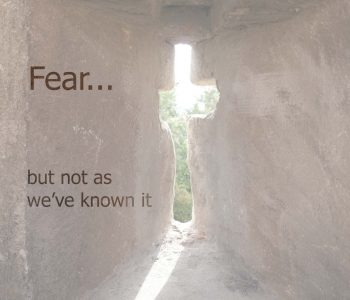 But Not As We've Known It
But Not As We've Known It
The World… but not as we’ve known it
It is fairly safe to say that there is at least one verse in the Bible that every Christian (and even non-Christians) are very familiar with. And it is a very important one.
“God loved the world so much, that He gave His only Son, so that every one who believes in Him shall not be lost, but should have eternal life” (John 3:16).
We are told that God loves this world and that Christ has come to reconcile this world with Himself. Obviously those who know this very good news will be the most optimistic, joyful people, overflowing with hope, and full to the brim with God’s deep love for this world!
In families we often see that a love of one or other of the parents is passed onto the children; the children are a representation of the parent. So if cars, or reading, or music are a love of a parent, the children often have the same love. It would be strange and unusual for a child to instead develop an aversion or a hatred of the thing that the parent loved, and yet, very sadly, this is sometimes what is seen in Christians when it comes to this world that our Father loves so much.
Instead of having His heart full of love with a deep desire for reconciliation with “the world”, the exact opposite is often exhibited: an apprehensiveness and suspicion of the world, motivated by a fear of being tainted by them, and evidenced by disdain for anyone associated with “the world”. This fear often results in exclusiveness and sectarianism (extremes being the Amish, Society of Friends etc.). Followers of other religions and people who are perceived to be “of the world” are typically treated like they are inferior, contagious, unclean and not as valuable to God as church-goers are.
Does that attitude reflect God’s heart?
“All things are from God, who reconciled us to Himself through Christ and who gave us the ministry of reconciliation. In other words, God was reconciling the world to Himself through Christ, by not counting people’s sins against them. He has trusted us with this message of reconciliation. So we are ambassadors who represent Christ. God is negotiating with you through us. We beg you as Christ’s representatives, ‘Be reconciled to God!'” (2 Cor. 5:18-20).
Unfortunately this attitude of superiority is prevalent in most churches – they do not mix with “the world”, they usually have as little as possible to do with them, unless they are performing “good deeds” to try to convert “the world”; with an agenda of people joining their religious club. Jesus had this to say about such an attitude: “How terrible for you… you hypocrites! You sail the seas and cross whole countries to win one convert; and when you succeed, you make him twice as deserving of going to hell as you yourselves are!” (Matt. 23:15).
This wrong attitude can develop toward people due to false teaching about what the Bible says about this world, because not only are we told in the Bible that God loves this world, but we are also told that we are not of this world, and don’t be surprised if the world hates you, etc.. The Bible is not contradicting itself, it is us who may be contradicting ourselves if we have misunderstood what the term “the world” means in its context.
One of the most successful ways of thwarting God’s aim of reconciliation is for Christians to be unloving and suspicious of people and things in the world. This typically reveals itself in two ways: being outwardly suspicious and being inwardly focussed.
Outward
Being outwardly suspicious of the world goes back a very long way. Even Paul wrote about it. In his day eating certain foods was considered wrong. Before we chuckle and think how archaic that was, just remember that even today many consider drinking any form of alcohol is wrong. Only a generation ago going to the movies or playing card games was considered worldly. Before that it was dancing. Before that it was music. Musical instruments were considered too worldly for churches for hundreds of years, and in more recent times, even drums and electric guitars were often “too worldly” for the church!
However, what is far more important than things in this world, is people! Paul wrote, “You are free to eat any kind of food. You understand that. But other Christians do not understand so well. So you must be careful. Do not cause them to do something that they think is wrong… I do not want to hurt any of my Christian friends. So, if the food that I eat causes them to do something wrong, I will never eat meat again” (1 Cor. 8:9,13). Our freedom is a wonderful thing, but not if it causes harm to others.
“Yes, I am a free man. I am not anybody’s slave. But I choose to serve everybody like a slave. I do that so that I can help many more people to believe in Christ.”
Note that Paul does not say that he served only believers. He said he was serving everybody so he could bring them to Christ (believers are already there)! He goes on:
“When I was among Jews, I lived like they do, because I wanted to bring Jews to Christ. The Law that God gave to Moses no longer has authority over me. But I chose to obey that Law when I was among Jewish people who obey it. I did that so that I could help them to believe in Christ. With Gentile people, who do not have Moses’ Law, I lived like they do. I continued to respect God’s Law. Yes, I obey Christ’s law. But I lived like a Gentile, so that I could help Gentiles to believe in Christ. With weak people, I became like someone who is weak too. I did that so that I could bring weak people to believe in Christ. Whoever I am living among, I live like they do. I want to do everything that I can to save some of them. I want to help people to accept God’s good news” (1 Cor. 9:19-23).
That doesn’t sound like Paul separated himself from the people of this world at all, does it? Instead of being intolerant, self-righteous and aloof, he lovingly adapted himself to those around him. Some did not agree with him doing this and accused him of being like “the world” (2 Cor. 10:1-3) because it was such a radical change to go from living as a religious Jew to living like a Gentile or a person in this world.
Inward
Being inward focussed makes Christians totally absorbed in themselves and in their world of religious and spiritual work, being very busy trying to make things happen – for God, of course! They become totally tied up in their own Christian community and are often loveless and very suspicious of anyone outside of that. The truth is that often “busyness” for God is a symptom of distrust and lack of faith in Him – needing to “help” Him make things happen.
As Jesus said, “When the Son of Man comes, will He find this faith on the earth at all?” He made that statement about faith and trust in the context of people who kept on pestering God without trusting Him: “To some who were relying on their own righteousness and looking down on everyone else, He told this parable: ‘Two men went up to the Temple to pray, one a religious person and the other a tax-collector… The religious person prayed to himself, O God! I thank you that I am not like the rest of humanity — greedy, dishonest, immoral, or like this tax-collector! I fast twice a week, I pay tithes on my entire income’” (Luke 18:6-12).
We see that the attitude of the government worker was the opposite of the tithe-paying, fasting, church-going person. There is something about religion that inspires pride instead of humility, perhaps because religion is so tied up with things we are doing; it is all about us! Oh, how we need to search our hearts… how often do we who know God look down on those who do not yet know Him? Why would we do that when we are sinners who have been rescued by grace, just as they are? How often do we exhibit superiority instead of humility? How often do we misrepresent our Father’s heart of love, mercy and grace?
I have seen and been guilty of this wrong attitude that is so very prevalent in Christianity, and that is why I recognise it and am exposing it. I grew up knowing only Christian people, completely insulated in a Christian environment on the mission field. I did not love the people “in the world”, I was suspicious of them, and had as little as possible to do with them. I self-righteously looked down on them. After all, we were “the chosen”, they were not. We went to church, they did not. I knew God, they did not. However, I noticed that when Father called me out of the church, my heart was slowly changed. I knew that I did not have a love for the people of this world, but I also knew that my Father does! So I asked Him to give me His love… and the more He has consumed my heart, the more love and understanding He has given me for those who don’t yet know Him, those whom the church have often separated themselves from and disparagingly called “the world”.
This attitude in the church is very similar to how the Jews in Jesus’ day thought of and treated the Samaritans and Gentiles. The Hebrew people had a long history of separation from other peoples and nations, as prescribed by God. There was to be no mixture. These laws were symbolic of what God had in mind for Christ’s body spiritually. And, like so many things in the Old Covenant, with the arrival of the Man who embodied and fulfilled all of God’s law, those laws ended (Heb. 8:13, 9:8-10 & chapter 10). Jesus gave one new law: “I give you a new command: Love each other. You must love each other just as I loved you. All people will know that you are My followers if you love one another” (John 13:34,35 see also Rom. 13:8,10; Gal. 5:14; Jam. 2:8).
We see in the book of the Acts that the followers of Jesus (including Paul) had to have a radical mindset and heart change in order to accept “outsiders”, and so do we. They too had grown up thinking they were the chosen “special” ones of God and so they looked down on others with disdain.
Christians and Non-Christians
Peter said, “You all know that we Jews do not become friends with Gentiles. Our Jewish laws do not let us visit the homes of Gentiles. But God has now shown me something different. I should not say about anyone that God will not accept them.” (Acts 10:28). This new Way of living, loving and thinking caused quite a few problems for them as it was so radically different to what they were used to (read from Acts 11 to the end of the book).
Yet Christians today often still have this same attitude of giving preference to each other, over those who are in “the world” and are suspicious and unaccepting of anybody deemed not to be “Christian”. This is, quite simply, offensive and unChrist-like. We cannot see Jesus ever being like that, either in the days when He walked this earth, or today. It stinks of death, and not of Life. It is an attitude that reeks of worldly prejudice and pride, and judging by what we think instead of what God thinks. It is the opposite of what the Bible teaches:
“You have now become a new person and are always learning more about Christ. You are being made more like Christ. He is the One Who made you. This new creation allows no room for discriminating between Gentile and Jew, circumcised and uncircumcised, foreigner, savage, slave, free man; on the contrary, in all, Christ is everything and in everything. As holy people whom God has chosen and loved, be sympathetic, kind, humble, gentle, and patient. Try to understand other people. Forgive each other. If you have something against someone, forgive him. That is the way the Lord forgave you. And to all these things, you must add love. Love holds everything and everybody together and makes all these good things perfect” (Col. 3:10-14).
Jesus deliberately and wholeheartedly embraced those who were “of the world”. Due to our familiarity with the Bible, we often don’t realise how very radical and offensive He was in what He said and did. The Samaritans, like the Gentiles, were vilified by the Jews – similar to how Christians often refer to Muslims today. Samaritans were considered spiritually corrupt, rebellious, and idolatrous – in today’s church, they would be non-christians and followers of other religions: “the world”. And yet Jesus spent several days in a Samaritan village (John 4:40) and had the nerve to tell a story about a Samaritan who was actually good while the religious were bad (Luke 10:25-37). He was even accused of being a Samaritan Himself (John 8:48).
Jesus had friends who worked for the “enemy” (the Roman government), the most notable being His friend Matthew who wrote: “Jesus ate dinner at Matthew’s house. Many tax collectors and others with bad reputations came and ate with Him and His followers. The Pharisees saw that Jesus was eating with these people. They asked His followers, ‘Why does your teacher eat with tax collectors and other sinners?’” (Matt. 9:10,11). This was not normal or expected behaviour for someone holy and spiritual!
Jesus was even friendly and kind to adulterers and prostitutes (Luke 7:36-50; John 4:1-42, 8:1-11). Clearly, He had absolutely no problem with spending His valuable time with the immoral of “the world”. He loved and welcomed them. He did not separate Himself from them. He was not suspicious of them. He was not afraid of being tainted by them. He was not threatened by their lifestyle choices. He did, however, have very little time for the religious. For them He reserved His harshest words, exposing them as frauds, hypocrites, snakes, and murderers (Matthew chapters 12 & 23).
The Jesus of the Bible (as opposed to the Jesus of Churchianity) was more at home with the people of this world, than with religion’s teachers and leaders. So, is it possible that the term “the world” as used in the Bible may mean something quite different to what we have thought or been taught? Have we possibly been deceived in this area? Perhaps some unveiling needs to occur….
Who or What is “the World”?
We have the record of an interesting conversation that Jesus had with His brothers who were concerned that Jesus wasn’t doing what was expected of Him from a human point of view: “Jesus traveled throughout Galilee. He didn’t want to travel in Judea, because the Jewish authorities wanted to kill Him. When it was almost time for the Jewish Festival of Booths, Jesus’ brothers said to Him, ‘Leave Galilee. Go to Judea so that Your disciples can see the amazing works that You do. Those who want to be known publicly don’t do things secretly. Since You can do these things, show Yourself to the world!’” (John 7:1-4).
That makes sense to our way of thinking and doing things in this world. You can imagine this argument being acceptable in almost any ministry or church today: He should have been advertising and marketing Himself and going where He would be seen and appreciated so more would know about Him. Jesus reply to His brother’s suggestion was, “The world can’t hate you, but it does hate Me because I accuse it of doing evil” (John 7:7).
Now, that is rather an unusual response to such a helpful suggestion of promoting Himself and His ministry! We need to stop here and ask: who was “the world” that Jesus was referring to? Who in the world did Jesus ever accuse of evil?
“How can you speak good things while you are evil?” (Matt. 12:34). He said that to the religious. Note that He didn’t say just the things they did were evil, but that they themselves were evil. And who hated Him and wanted to kill Him? The religious. And so it is today!
When Stephen said, “Look, I see the heavens opened and the Son of Man standing in the place of honor at God’s right hand!” the record says, “Then they put their hands over their ears and began shouting. They rushed at him and dragged him out of the city and began to stone him.”
A question needs to be asked: who were “they”?
They were once again religious people, “These men were from one of the Jewish meeting places in Jerusalem. People called them, ‘The Group of Free Men’… Then they bribed some men to lie. These men said, ‘We heard him slander Moses and God.’ The liars stirred up the people, the leaders, and the experts in Moses’ Teachings. So they went to Stephen, took him by force, and brought him in front of the Jewish council” (Acts 6:9,11,12).
So it wasn’t the governing Romans who stoned Stephen.
It wasn’t “the world”.
It wasn’t the government.
It was the religious followers and the leaders of the church of their day. It was the religious people who were dangerous because they were motivated by the spirit of this world; these same ones also crucified Christ.
The only people whom Jesus rebuked and revealed as hypocrites, were those whose life was religion: religious leaders and the people who believed in and followed them. Jesus told the religious leaders that they were blind leaders leading the blind, “I assure you that tax collectors and prostitutes are entering God’s kingdom ahead of you.” (Matt. 15:14, 21:31). How deeply offensive that would have been to them! No wonder they wanted to kill Him.
Although Jesus did not intervene or get involved in politics or government, He did speak out very clearly against religion which presumed to speak on behalf of His Father. This is typical of His back-to-front Kingdom, where things seem to be the reverse of what we in this world would expect! Even His disciples thought Jesus had come to save Israel from the oppressive Roman government, but He had come to save people from something far bigger: “My kingdom does not belong to this world. If it did, My servants would fight so that I would not be handed over to the Jewish leaders. No, My kingdom is not an earthly one” (John 18:36).
There is no room for nationalism here. His kingdom was not of “this world” then, and still isn’t today, “The world would love you as one of its own if you belonged to it, but you are no longer part of the world. I chose you to come out of the world, so it hates you” (John 15:9).
So what was the world that Jesus said that we are no longer part of and that would hate us? I don’t believe it was mankind, because that’s not possible. I don’t believe it was not to be part of the earth or universe, because that’s not possible either. It didn’t even always refer to people. What is possible, is that this word often meant mindsets and mentalities: the fashion, honour, order, values, the religious systems, environments and cultures, because that is exactly what and who Jesus rebuked.
Kosmos
The Greek word translated as “the world” is kosmos, and has several meanings:
- order
- lawful order, government
- mode, fashion
- world affairs
- ornament, decoration
- honour, credit
- ruler
- world, universe, the earth
- mankind
In the New Testament the word “world” is usually used in one of three ways: of the earth, of the people of the earth, and thirdly of the systems and thinking of this earth. This third meaning seems to be often overlooked or misunderstood by Christianity. It is vital that we discern the correct meaning whenever the word is used in the scripture, because failure to distinguish and discern between each of these definitions can give a very wrong interpretation of what the Bible actually says (for a more in-depth look at this word in the Bible, and its possible meanings, I have given some references at the end of this article).
The word cosmetic is from this root word kosmos and that should tell us something! It can refer to the culture, fashion, or embellishments of the day, being synonymous with and having the same values as society.
Sometimes the word was indeed referring to people, but often it was not at all; it was instead referring to the culture or systems of this world. In a word, it was world-likeness, including religiosity, that Jesus was, and still is up against. Jesus did not fit into the culture of His country, especially the religious culture, and neither do we. He was radical and spoke out against things that the Jewish culture believed and held sacred (such as observing the sabbath). If only we would examine ourselves to see whether we are more like this world and following its ways of doing things…
“Worldliness is not necessarily going out with the world in its pursuits, pleasures, passions, interests. Worldliness is world-likeness, and world-likeness is to be actuated by the spirit of the world. What is that? In a word, it is personal interest. This can be just as strong in the things of the Kingdom of God as in other things. Ambition, reputation, prestige, influence, power, opportunity, advantage, recognition, appreciation, success, following, acceptance, favour, place, etc., this is the world-spirit. They all contain – recognised or unrecognised – pride, jealousy, envy, covetousness, prejudice, unbelief, bitterness, and many other things which come out when such considerations are thwarted or checked.” (T. Austin-Sparks, “The Servant of the Lord” – Chapter 5)
This “world-likeness” is much bigger than what we can see, it affects how we think and feel. It is our culture, our traditions, our mindsets, the influences of our day: social media, what we watch, who we listen to and believe, the people we look up to, honour and “worship”, especially in the context of religion. That is the world we’re not to be part of: the religious, political, cultural order and thinking of our day. For Christians that especially includes today’s “evangelical popular culture” of TV evangelists, “Christian” news and radio, popular “Christian” books and music – almost all are biased and grossly distorted by the spirit of this world.
When we see how this one word “world” has been misinterpreted to mean the people in the world that Jesus does care about and love, the world He died for and wants to reconcile with Himself, we see how devious and wrong it is. These are the very people that “Christians” often don’t want to have anything to do with simply because they are deemed to be “of the world”! They often treat these people shamefully – that is what their “Christian culture/world” has programmed and taught them to do.
This kind of wrong thinking creates a very suspicious “us and them” attitude, with the belief that “they are out to get us” and “we are under attack”, “we are good” and “they are bad”. That is incredibly damaging and divisive, it gives rise to suspicions, negativity, defensiveness, aloofness, and most of all: fear. It is all about stirring up fear and distrust and we know exactly where that spirit is from.
It is incredibly sad and diabolical that what Jesus said about the world has often been twisted into a rule that distances Christians from the very people He loves and gave His life for! And just to be clear: in advocating being friends with people in this world, we are not trying to actively “convert” them, we are not trying to “minister” to them, we are simply loving them for who they are, where they are! We have no agenda, we simply love whoever, wherever, whenever, just as Jesus did.
“When you see love in someone’s eye, that’s a place you want to go! But when you see suspicion, or judgment, or condemnation, manipulation, control, and hidden agendas, you start walking sideways… The look of love needs to be in our eye. You can’t fake it. A love that is good for enemies? It doesn’t exist down here, there’s only one place to get it, it’s at that throne of grace that we have free access to by the blood of Jesus, by this new and living Way. We can get it from that Place. And that kind of love is redemptive; it’s not reactive. It can love things that are bad, and if they can believe it, it’ll change them! God knows this world needs redemption, not reaction… Little by little we become great lovers with Jesus. And the kind of love He’s given us is the kind of love that you can go to hell with and you can come back with those that you’ve snatched from the fire.” (Jay Ferris, Love).
There is no denying that love is the message of the Bible, exemplified in Christ Himself. Because of Him and in Him we can be the most lovely, most loving people this earth has ever seen! This love is real and genuine, from the heart of God Himself.
Hear what Paul wrote to the Corinthians: “Give no offense either to Jewish or Greek people (unbelievers) or to God’s community—just as I also try to please everyone in everything, not seeking my own benefit but the benefit of many, so that they may be saved. In my previous letter I said, ‘Don’t mix with the immoral.’ I didn’t mean, of course, that you were to have no contact at all with the immoral of this world, nor with any cheats or thieves or idolaters—for that would mean going out of the world altogether! But in this letter I tell you not to associate with any professing Christian who is known to be an impure man or a swindler, an idolater, a man with a foul tongue, a drunkard or a thief. My instruction is: “Don’t even eat with such a man.” Those outside the church it is not my business to judge, but surely it is your business to judge those who are inside the church—God alone can judge those who are outside. It is your plain duty to put away from yourselves that wicked person.” ((1 Cor. 10:32-33; 5:9-13).
We see so many Christians today typically do the exact opposite of what Paul said, by staying away from those they judge to be immoral and sinners in the world, while hiding, even protecting, anything and anyone wrong and immoral within the church! Yes, something is very, very wrong here. There are just so many cases of immorality, control and abuse in the church being exposed, and usually the church has ignored, hidden, denied, and even defended the indefensible. The world sees these things when the media rightly exposes them, revealing the worldliness that is rampant in the church system, and instead of dealing with the problem, the church often compounds their wrongdoing by saying that the media shouldn’t investigate and expose such things, as if it were the media’s fault! Is it not possible that the media are actually doing God’s work in exposing these things? “Have nothing to do with the useless works that darkness produces. Instead, expose them for what they are” (Eph. 5:11).
The Religious System
Religion is a construct of this world because it is man’s system of rules and laws to try to appease God. Churches have a product to sell and use marketing, advertising, manipulation, and control, even using this world’s ways of merchandising and doing business instead of trusting God’s ways and means. It is the opposite of faith. It is painfully obvious what spirit is behind it all, and we know exactly how Jesus felt about it too (John 2:14-16).
It is the values, the preferences, the manipulation and influence of this world’s systems and ways of doing things that we are not to have any part of. This world’s system relies on itself to accomplish things. It tries to make things happen in its own strength. Trust and faith are completely foreign to it.
And why are we not part of that world? Because we have been born into another realm, we are part of another world, and our real life is there (Eph. 2:1-10). That is why John wrote: “Everyone who is born from God defeats the world. And this is the victory that has defeated the world: our faith” (1 John 5:4).
Our faith! That is how we are not of this world and how we live above this world’s ways, and do not participate in its lies and belief systems. We are just not part of that world. T. Austin-Sparks has summed this up very well (italics mine):
“The world is… whenever you and I are tempted to a human or natural consideration, in whatever realm, to accept that which is presented to us through our senses. Faith is the victory that overcomes the world. Faith overcomes sense, sight, personal desire, everything that this world craves for. Faith says: there is something more than that. That, after all, at best and at most is limited, fading, the world passes. Faith says there is more than that, and I go for the more.” (T. Austin-Sparks, The Victory That Overcomes – Chapter 2)
This is the reason why Abraham and the others listed in Hebrews 11 were content with “not receiving in this world” what was promised to them. This world was no longer their world! Everything was fulfilled by their relationship with God, He was their everything, not this world and what it has to offer. The chapter ends with: “All these people didn’t receive what was promised, though they were given approval for their faith”.
Whether the “thing” promised happened or not in their lifetime in this world, did not matter. That was and still is, the essence of faith and trust. Our Life is not based in this world, or based on its values, concerns, and ways. We are truly aliens!
Christ is our Life and with Him we love the people of this world! We must learn to discern between people (always loved) and the systems, mindsets, and cultures of this world which are not always benevolent, but quite the opposite.
Being Lights
Paul said that we are lights to the unbelieving (Acts 13:47). How can we be lights if we separate ourselves from those in the world and stay in our own four walls? How is going to a church meeting being a light to unbelievers? It quite simply isn’t. It is in living side by side with people in the world and loving them in every day life that we are lights, because if we are only friends with fellow believers, then our light is not able to shine in the world, it is effectively hidden. In the book of the Acts we have recorded that the believers were scattered – this was God’s doing, sending His lights far and wide, thus spreading His love far and wide!
“My friends, we should all love each other. It is God who makes us able to love other people. Everyone who loves other people has become a child of God. That person knows God. Anyone who does not love other people does not know God. We know this because God’s own nature is love… This shows what love is: It is not that we have loved God, but that He loved us. He loved us so much that He sent His Son to save us from sin. He sent Jesus to die as a sacrifice, to take the punishment for our sins. My friends, this shows how much God has loved us. So we should also love one another. Nobody has ever seen God. But, if we love each other, it shows that God lives in us. As a result, we can love people completely, in the same way that God loves us” (1 John 4:7-12).
May we be seen as those who are clearly out of this world because of our lavish love for others, exhibiting all the heavenly characteristics of our Father, especially towards those who do not yet know Him like we do! He loves people, and so do we. He wants them to know Him personally, as their Father. He wants to attract and draw people to Himself through His Life and Love in us, and so we are always ready to share our source of incredible Hope and Love (1 Pet. 3:15). Let’s be those whom this world cannot help but be attracted to as we exhibit our Father’s deep love for them!
“This is how God showed that He loves us: He sent His only Son to come and live in the world. He did that so that we could have true life with God because of His Son” (1 John 4:9).
“World” Verses
Below is a sample of verses that speak both positively and negatively about this world (omitting obvious verses where ‘world’ means this earth). This illustrates the need for discernment, to know what the word ‘kosmos’ is referring to and where the meanings may even overlap.
Positive
(referring to people)
You are the light of the world (Matt. 5:14).
The field is the world (Matt. 13:38).
Go to all the world (Mark 16:15; John 17:18).
I in them and You in Me, that they may become perfectly one, so that the world may know that You sent Me and loved them even as You loved Me (John 17:23).
God loved the world so much that He gave His one and only Son… (John 3:16).
God sent His Son into the world not to judge the world, but to save the world through Him (John 3:17).
The true bread of God is the one who comes down from heaven and gives life to the world (John 6:33).
Jesus spoke to them, saying: I am the light of the world (John 8:12).
I did not come to judge the world but to save the world (John 12:47).
And He, when He comes, will convict the world about sin and the need for a Savior, and about righteousness, and about judgment (John 16:8).
For God was in Christ, reconciling the world to Himself, no longer counting people’s sins against them. And He gave us this wonderful message of reconciliation (2 Cor. 5:19).
Look! The Lamb of God who takes away the sin of the world! (John 1:29).
The gospel is bearing fruit and growing in the entire world, just as it also has been doing among you from the day you heard it and came to know the grace of God in truth (Col. 1:6).
Undeniably, great is the mystery of godliness: He was revealed in flesh, was justified in spirit, was seen by messengers, was preached among the nations, was believed on in the world, was taken up in glory (1 Tim. 3:16).
We have seen and testify that the Father has sent the Son to be the savior of the world (1 John 4:14).
Negative
(referring to people)
He came into the very world he created, but the world didn’t recognize Him (John 1:10).
That you may be blameless and innocent, children of God without blemish in the midst of a crooked and perverse generation, among whom you shine like lights in the world (Phil. 2:15).
Negative
(referring to values and culture)
I have come as a light to shine in this dark world, so that all who put their trust in Me will no longer remain in the dark (John 12:26).
The married man is concerned about worldly things, how he may please his wife (1 Cor. 7:33).
Indeed, this is our boast: Our conscience testifies that we have conducted ourselves in the world with God-given holiness and sincerity, not with the wisdom of the flesh, but rather in God’s grace—especially toward you (2 Cor. 1:12).
See to it that nobody enslaves you with philosophy and foolish deception, which conform to human traditions and the way the world thinks and acts rather than Christ (Col. 2:8).
If then you have died with Christ to material ways of looking at things and have escaped from the world’s crude and elemental notions and teachings of externalism, why do you live as if you still belong to the world? (Col. 2:20).
The worship that God wants is this: caring for orphans or widows who need help and keeping yourself free from the world’s evil influence. This is the kind of worship that God accepts as pure and good (James 1:27).
Don’t you know that loving the world is hating God? Whoever chooses to be the world’s friend makes himself God’s enemy! (James 4:4).
Do not love or cherish the world or the things that are in the world. If anyone loves the world, love for the Father is not in him. For all that is in the world—the lust of the flesh [craving for sensual gratification] and the lust of the eyes [greedy longings of the mind] and the pride of life [assurance in one’s own resources or in the stability of earthly things]—these do not come from the Father but are from the world [itself].And the world passes away and disappears, and with it the forbidden cravings (the passionate desires, the lust) of it; but he who does the will of God and carries out His purposes in his life abides (remains) forever (1 John 2:15-17).
Negative
(referring to systems)
What sorrow awaits the world, because it tempts people to sin (Matt. 18:7).
The world can’t hate you, but it does hate Me because I accuse it of doing evil (John 7:7).
(To the religious): You are from below; I am from above. You are of this world; I am not (John 8:23).
The world would love you as one of its own if you belonged to it, but you are no longer part of the world. I chose you to come out of the world, so it hates you (John 15:9).
You will have suffering in this world. Be courageous! I have conquered the world (John 16:33).
I am not praying that you take them out of the world but that you protect them from the evil one. They are not of the world, just as I am not of the world. As you sent Me into the world, I also have sent them into the world (John 17:15,16,18).
In the same way, we too were slaves of the ruling spirits of the world before we reached spiritual maturity (Gal. 4:3).
As for me, may I never boast about anything except the cross of our Lord Jesus Christ. Because of that cross my interest in this world has been crucified, and the world’s interest in me has also died (Gal. 6:14).
You were following the ways of this world [influenced by this present age], in accordance with the prince of the power of the air (Satan), the spirit who is now at work in the disobedient [the unbelieving, who fight against the purposes of God] (Eph. 2:2).
Be careful that no one takes you captive through philosophy and empty deceit based on human tradition, based on the elements of the world, rather than Christ (Col. 2:12).
You adulterers! Don’t you realize that friendship with the world makes you an enemy of God? I say it again: If you want to be a friend of the world, you make yourself an enemy of God (James 4:4).
Do not love this world nor the things it offers you, for when you love the world, you do not have the love of the Father in you. For the world offers only a craving for physical pleasure, a craving for everything we see, and pride in our achievements and possessions. These are not from the Father, but are from this world (1 John 2:15,16).
We know that we are children of God and that the world around us is under the control of the evil one (1 John 5:19).
Everyone who is born from God defeats the world. And this is the victory that has defeated the world: our faith. (1 John 5:4).
Now we have not received the spirit of the world, but the Spirit who comes from God, so that we may understand what has been freely given to us by God (1 Cor. 2:12).
Don’t let anyone capture you with empty philosophies and high-sounding nonsense that come from human thinking and from the spiritual powers of this world, rather than from Christ. You have died with Christ, and he has set you free from the spiritual powers of this world (Col. 2:8,20).
He has given us valuable and superlatively great promises, so that through them you might come to share in God’s nature and escape the corruption which evil desires have brought into the world (2 Pet. 1:4).
If, after they have escaped the defilements of the world through the knowledge of our Lord and Savior Jesus Christ, they are again entangled in them and overcome, the last state has become worse for them than the first (2 Pet. 2:20).



















